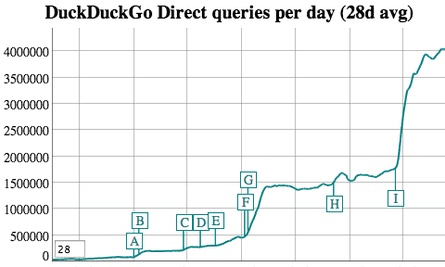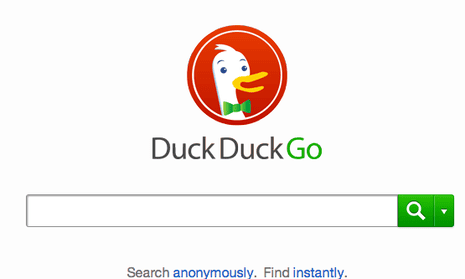DuckDuckGo, the privacy-focused search engine, served over 1bn searches in 2013 after a huge surge in interest following the Snowden revelations.
Until Edward Snowden's files detailing the extent of state surveillance, the search engine received around 1.5m queries per day. But in the weeks and months following the Guardian's publication of the NSA files, the number of users more than doubled.
By November, more than 4 million people were using the site every day, and on Tuesday 7 January the site had its biggest day so far, serving 4,452,957 queries in a 24-hour period.
"Needless to say, it was a great year for us," DuckDuckGo said in a blogpost. "We're looking forward to similar greatness in 2014. We have a lot of big things planned for this year that we hope will address a lot of the excellent feedback you have been giving us for some time. So please stay tuned."

DuckDuckGo's pitch to users is a sort of anti-Google. The site doesn't store personal information such as IP addresses, preventing searches from being linked to individuals, and keeps data safe from third parties by enabling encryption by default.
Google began encrypting all searches by default in September 2013, too late to prevent DuckDuckGo's post-Prism gains, but users still have to jump through hoops to stop the site storing their own searches. By default, any user signed in to their Google account has their search terms saved to the site's Web History feature, and the site also logs user searches separately, "to prevent spam and abuse and to improve our services".
It also touts the side benefits of that policy. Without any saved searches, it cannot present personalised search results, freeing users from the "filter bubble" effect. That term refers to the fact that, as search results are increasingly personalised, users are less likely to be presented with information that challenges preconceptions or introduces something entirely new and serendipitous.
For instance, a passionate environmentalist searching for climate change may be offered results on climate action, while someone who has less of an interest may be shown purely informative results.
While these selling points have served to boost DuckDuckGo's user base to its current level, it still has a long way to go. The last time Google was serving that many searches per day was September 1999, when it had been incorporated for only one year. As a proportion of internet users, DuckDuckGo's share of the search market is even smaller than the nascent Google's.
Google currently touts "over 1 trillion searches a year" in the 146 languages the company serves.
Other secure searching services have had strong years as well. StartPage, which offers Google results through a proxy that allows for anonymous searching, and Ixquick, produced by the same company but offering results from multiple search engines, boasted of 4m direct private searches a day in July this year.
"People are making major changes in their online habits and looking for ways to protect their private information from US government surveillance," said chief executive Robert Beens at the time. "Since we don't store IP addresses or use tracking cookies, we've offered powerful privacy protection to our users since 2006. Our fans especially appreciate the fact that we are a Dutch company, which means we are not directly subject to the US Patriot Act. And of course, we have never participated in any program like Prism."
But if secure searching is now where Google was at the end of 1999, it had better keep up the momentum. By the close of the millennium, Google was handling more than 100m queries a day.
"Google's dominance will lessen," says Albert Wenger of Union Square Ventures
Updated 10 January to clarify what information DuckDuckGo stores.
